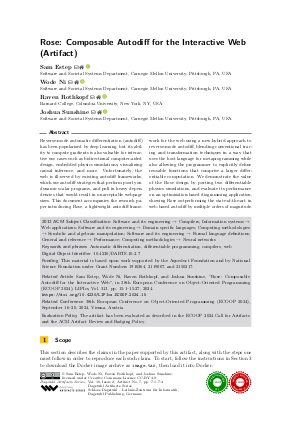Rose: Composable Autodiff for the Interactive Web (Artifact)
Authors
Sam Estep  ,
Wode Ni
,
Wode Ni  ,
Raven Rothkopf
,
Raven Rothkopf  ,
Joshua Sunshine
,
Joshua Sunshine 
-
Part of:
Issue:
Special Issue of the 38th European Conference on Object-Oriented Programming (ECOOP 2024)
Part of: Volume: DARTS, Volume 10 (ECOOP 2024)
Part of: Conference: European Conference on Object-Oriented Programming (ECOOP)
Part of: Journal: Dagstuhl Artifacts Series (DARTS) - License:
 Creative Commons Attribution 4.0 International license
Creative Commons Attribution 4.0 International license
- Publication Date: 2024-09-12
Artifact Description

PDF
DARTS.10.2.7.pdf
- Filesize: 0.49 MB
- 4 pages
Document Identifiers
Subject Classification
ACM Subject Classification
- Software and its engineering → Compilers
- Information systems → Web applications
- Software and its engineering → Domain specific languages
- Computing methodologies → Symbolic and algebraic manipulation
- Software and its engineering → Formal language definitions
- General and reference → Performance
- Computing methodologies → Neural networks
Keywords
- Automatic differentiation
- differentiable programming
- compilers
- web
Metrics
- Access Statistics
-
Total Accesses (updated on a weekly basis)
0PDF Downloads0Metadata Views
Abstract
Reverse-mode automatic differentiation (autodiff) has been popularized by deep learning, but its ability to compute gradients is also valuable for interactive use cases such as bidirectional computer-aided design, embedded physics simulations, visualizing causal inference, and more. Unfortunately, the web is ill-served by existing autodiff frameworks, which use autodiff strategies that perform poorly on dynamic scalar programs, and pull in heavy dependencies that would result in unacceptable webpage sizes. This document accompanies the research paper introducing Rose, a lightweight autodiff framework for the web using a new hybrid approach to reverse-mode autodiff, blending conventional tracing and transformation techniques in a way that uses the host language for metaprogramming while also allowing the programmer to explicitly define reusable functions that comprise a larger differentiable computation. We demonstrate the value of the Rose design by porting two differentiable physics simulations, and evaluate its performance on an optimization-based diagramming application, showing Rose outperforming the state-of-the-art in web-based autodiff by multiple orders of magnitude.
Cite As Get BibTex
Sam Estep, Wode Ni, Raven Rothkopf, and Joshua Sunshine. Rose: Composable Autodiff for the Interactive Web (Artifact). In Special Issue of the 38th European Conference on Object-Oriented Programming (ECOOP 2024). Dagstuhl Artifacts Series (DARTS), Volume 10, Issue 2, pp. 7:1-7:4, Schloss Dagstuhl – Leibniz-Zentrum für Informatik (2024)
https://doi.org/10.4230/DARTS.10.2.7
BibTex
@Article{estep_et_al:DARTS.10.2.7,
author = {Estep, Sam and Ni, Wode and Rothkopf, Raven and Sunshine, Joshua},
title = {{Rose: Composable Autodiff for the Interactive Web (Artifact)}},
pages = {7:1--7:4},
journal = {Dagstuhl Artifacts Series},
ISBN = {978-3-95977-342-3},
ISSN = {2509-8195},
year = {2024},
volume = {10},
number = {2},
editor = {Estep, Sam and Ni, Wode and Rothkopf, Raven and Sunshine, Joshua},
publisher = {Schloss Dagstuhl -- Leibniz-Zentrum f{\"u}r Informatik},
address = {Dagstuhl, Germany},
URL = {https://drops.dagstuhl.de/entities/document/10.4230/DARTS.10.2.7},
URN = {urn:nbn:de:0030-drops-209053},
doi = {10.4230/DARTS.10.2.7},
annote = {Keywords: Automatic differentiation, differentiable programming, compilers, web}
}
Author Details
Funding
This material is based upon work supported by the Aqueduct Foundation and by National Science Foundation under Grant Numbers 1910264, 2119007, and 2150217.
Artifact
DARTS-10-2-7-artifact-609d5d4bc6f1182191b303b77dca2d7b.tar
(Filesize: 15.5 GB)
MD5 Sum:
609d5d4bc6f1182191b303b77dca2d7b
(Get MD5 Sum)
Artifact Evaluation Policy
The artifact has been evaluated as described in the ECOOP 2024 Call for Artifacts and the ACM Artifact Review and Badging Policy.
